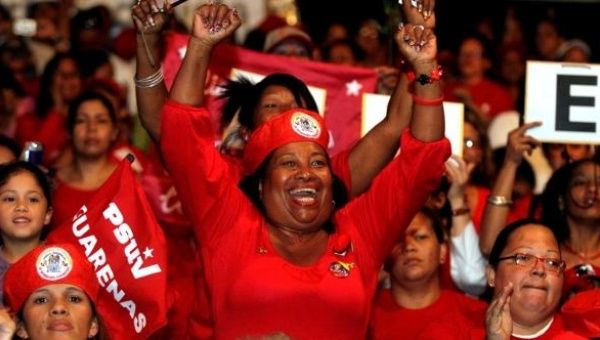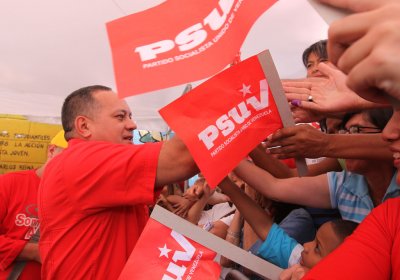Venezuela's Bolivarian Revolution will face its toughest challenge yet this Sunday, when voters go to the polls to elect a new National Assembly. Amid an economic crisis marked by currency instability and inflation, many Venezuelans are understandably going to be thinking hard before casting what would be seen as a vote in support of President Nicolás Maduro.
Bolivarian revolution
 Women are crucial to the Bolivarian process and will play a vital role in Venezuela's national elections next month, legislator and candidate for the governing United Socialist Party of Venezuela (PSUV) Tania Diaz told TeleSUR.
Women are crucial to the Bolivarian process and will play a vital role in Venezuela's national elections next month, legislator and candidate for the governing United Socialist Party of Venezuela (PSUV) Tania Diaz told TeleSUR.
 Workers from Venezuela's 'housing mission', which is building large numbers of public housing, march on Venezuela's independence day, July 5. Photo from Venezuela Analysis.
Venezuela's Bolivarian revolution has transformed the country since the rise to power of late socialist president Hugo Chavez in 1998 on a platform of tackling poverty and promoting participatory democracy.
Workers from Venezuela's 'housing mission', which is building large numbers of public housing, march on Venezuela's independence day, July 5. Photo from Venezuela Analysis.
Venezuela's Bolivarian revolution has transformed the country since the rise to power of late socialist president Hugo Chavez in 1998 on a platform of tackling poverty and promoting participatory democracy.
Condolences and tributes to legendary revolutionary and champion of women’s rights Nora Castaneda have been pouring in from across Venezuela after news of the activist’s death on May 16.
An economist, university lecturer and much-loved revolutionary, Castaneda is renowned for having founded and presided over Venezuela’s internationally celebrated Women’s Development Bank, “Banmujer” since 2001. She was also one of the chief protagonists of Venezuela's working-class women’s movement that emerged in the 1980s.
Members of Latin American solidarity organisations from various Australian cities met in Canberra on May 9 for a Gathering in Solidarity with Latin American Struggles and in Defence of Venezuela's Bolivarian Revolution. Around 40 representatives attended from Brisbane, Canberra, Melbourne and Sydney.
It is a point of honour for the Venezuelan government that despite the sharp plunge in oil prices and acute shortages of goods, President Nicolas Maduro has ruled out austerity measures.
In a recent TV interview with former vice president Jose Vicente Rangel, Venezuelan Central Bank president Nelson Merentes explained why, saying: “Do you remember what happened on February 27, 1989?”
Thousands of Venezuelans took part in May Day rallies on May 1 to mark the international workers' day and commemorate the achievements of the country's pro-poor Bolivarian revolution.
Speaking to May Day celebrations in Caracas, Venezuelan President Nicolas Maduro said: “Now is time for workers to lead the economic policy of the country.”
The Venezuelan government-initiated campaign calling for US President Barack Obama to repeal his executive order that arbitrarily declares Venezuela an "extraordinary threat" to US "national security" had more than 6 million signatures as March 31.
Venezuelan President Nicolas Maduro announced on his weekly television program that the campaign has collected 6.2 million signatures so far. “I believe that Obama's threat has awoken a great amount of love for what we are going for in our country,” said Maduro.
Since US President Barack Obama's administration decided to impose new sanctions on Venezuela on March 9, many people, including journalists, have asked what motivated them to do this.
Some are curious over the apparent inconsistency between this move and the White House decision in December to begin normalising relations with Cuba. Others are wondering why the Obama administration would do something that so obviously hurts the United States-backed opposition in Venezuela, at least in the short run.
Experience proves that left-wing movements can win government, but nevertheless not hold power. Democracy, in other words the exercise of power by the people and for the people, requires much more.
The problem is now being faced in Greece with with radical left party SYRIZA, which won elections in January. It will have to be faced in Spain if the new anti-austerity party Podemos wins November elections.
US hemispheric policy reached a new low on March 9 when President Barack Obama invoked emergency powers to declare “a national emergency with respect to the unusual and extraordinary threat to the national security and foreign policy of the United States posed by the situation in Venezuela.”
Thanks to Obama’s action, the US has now blatantly rehabilitated its traditional imperial posture towards the South and challenged the continent-wide Bolivarian cause of Latin American and Caribbean independence and sovereignty.
Trade unionists from more than 30 countries met in Caracas for the Third Union Encounter of Our Americas also expressed their support for Venezuela and willingness to mobilise to stop any possible aggression.
- Previous page
- Page 11
- Next page









